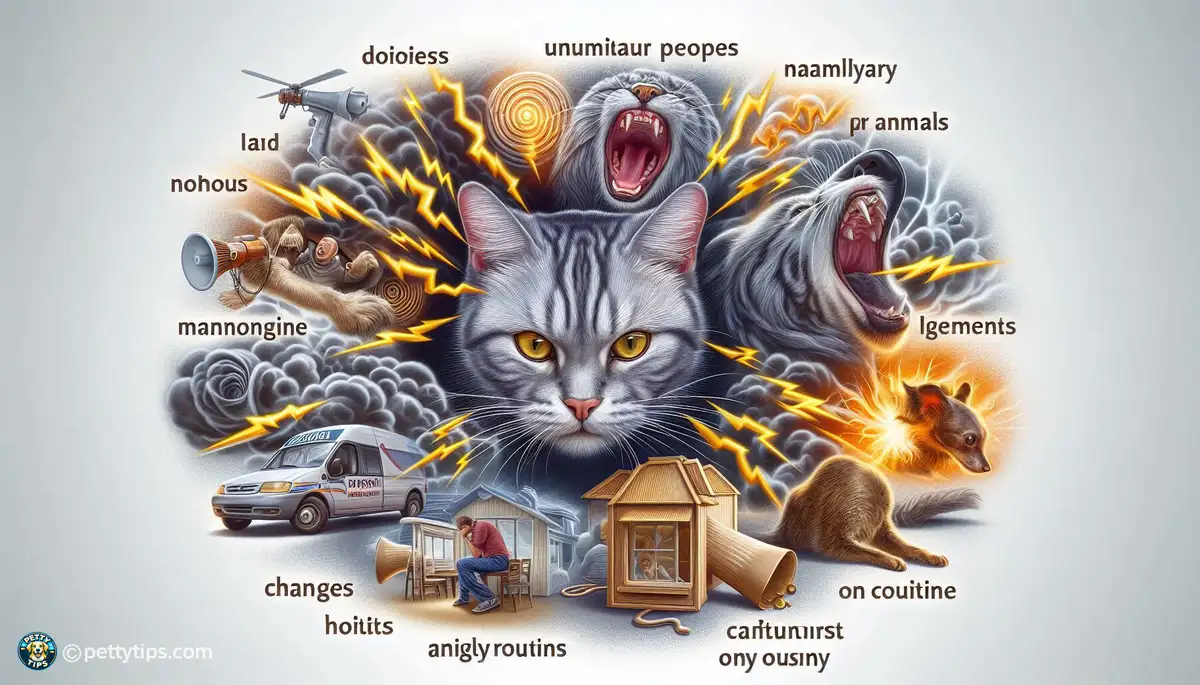
Feline Communication: Role of Pheromones
Ruby Gunther - Aug 19, 2024 - 6 min read


Introducing a new pet or even a new human member to the household can be a significant stressor for cats. Cats are creatures of habit and can become anxious when their territory is invaded. They may feel threatened or insecure, leading to behavioral changes like hiding, aggression, or excessive grooming.
Moving to a new environment can be overwhelming for cats. The unfamiliar smells, sights, and sounds can trigger anxiety, causing them to hide or exhibit signs of stress. It's essential to provide a safe space for your cat during the transition period and gradually introduce them to their new surroundings to help alleviate their anxiety.
Cats thrive on routine, and any disruptions to their daily schedule can cause stress and anxiety. Whether it's a change in feeding times, litter box location, or playtime schedule, cats can become unsettled when their familiar routine is altered. Providing consistency and stability in their daily routine can help reduce their anxiety levels.
Cats have sensitive hearing, and loud noises like thunderstorms, fireworks, or construction can be incredibly distressing for them. These sudden, unexpected sounds can trigger a fear response, causing cats to seek shelter and hide until they feel safe again. Creating a quiet, secure space for your cat during noisy events can help them feel more secure.
Cats are territorial animals, and conflicts with other cats or animals in the household can lead to anxiety and stress. Whether it's competition for resources like food or litter boxes or outright aggression, cats may feel threatened and anxious in their own home. Providing separate resources for each cat and monitoring their interactions can help reduce social stressors.
Proper socialization is essential for cats to feel confident and secure in their environment. Cats that have not been adequately socialized as kittens may exhibit fear or anxiety around unfamiliar people, animals, or situations. Gradually exposing them to new experiences and providing positive reinforcement can help build their confidence and reduce anxiety over time.
Cats are often perceived as independent animals, but they can also experience separation anxiety when left alone for extended periods. Cats form strong bonds with their owners and may become anxious when separated from them. Signs of separation anxiety in cats include excessive meowing, destructive behavior, and inappropriate elimination. Providing environmental enrichment, such as toys and interactive feeders, can help alleviate their anxiety when left alone.
Too many animals in one household can lead to overcrowding, which can be stressful for cats. Competition for resources, territory disputes, and lack of personal space can all contribute to anxiety in multi-cat households. Providing separate areas for each cat to eat, sleep, and play can help reduce tension and promote harmony among the feline residents.
Undiagnosed or untreated health issues can manifest as anxiety or stress in cats. chronic pain from conditions like arthritis or dental problems can cause cats to become irritable and anxious. It's essential to monitor your cat's behavior and seek veterinary attention if you notice any signs of discomfort or changes in behavior.
As cats age, they may experience cognitive decline and physical ailments that can contribute to anxiety and stress. senior cats may become more anxious due to changes in their environment, decreased mobility, or sensory impairments. Providing extra comfort and support to older cats can help alleviate their anxiety and improve their quality of life in their golden years.
Visits to the veterinarian or medical procedures can be stressful experiences for cats. The unfamiliar sights, smells, and handling by strangers can trigger anxiety and fear responses in cats. It's essential to practice positive reinforcement techniques and desensitization strategies to help cats feel more comfortable during veterinary visits and medical procedures.
Hormonal imbalances, such as hyperthyroidism or adrenal gland disorders, can affect cats' behavior and emotional well-being. Cats may exhibit symptoms of anxiety, restlessness, or aggression due to these underlying medical conditions. Regular veterinary check-ups and blood tests can help diagnose and manage hormonal imbalances in cats effectively.
Cats that have experienced abuse or neglect in their past may carry emotional scars that can manifest as anxiety or fearfulness. These cats may exhibit defensive behaviors, such as hiding or aggression, as a coping mechanism to protect themselves from perceived threats. Patience, understanding, and gentle handling are crucial when building trust with cats that have experienced trauma.
Cats that have been abandoned or surrendered to shelters may struggle with separation anxiety and fear of abandonment. These cats may exhibit clingy behavior or vocalize excessively when they fear being left alone. Providing a stable, loving home environment and plenty of reassurance can help build their confidence and alleviate their anxiety over time.
Natural disasters like earthquakes, hurricanes, or wildfires can be traumatic experiences for cats. The sudden upheaval, loud noises, and disruption to their environment can trigger intense anxiety and fear responses. It's essential to include pets in emergency preparedness plans and have a designated safe space where cats can seek shelter during natural disasters.
Accidents or injuries can also be traumatic experiences for cats, leading to anxiety and fear of certain situations or environments. Cats may develop phobias or aversions to specific stimuli associated with the traumatic event, such as car rides or loud noises. Gentle handling, patience, and positive reinforcement can help cats overcome their fears and regain their confidence after experiencing an accident or injury.
Certain cat breeds may be more prone to anxiety or stress due to their genetic makeup. For example, Siamese cats are known for their vocal and social nature and may become anxious when left alone for extended periods. Understanding the breed characteristics and providing appropriate mental and physical stimulation can help alleviate anxiety in predisposed cat breeds.
Inherited traits or temperament can also play a role in cats' susceptibility to anxiety. Cats with a nervous or skittish disposition may be more prone to developing anxiety in response to stressful stimuli. It's essential to provide a supportive and nurturing environment for these cats and avoid exposing them to unnecessary stressors whenever possible.
Early life experiences, such as inadequate socialization or maternal separation, can have a lasting impact on cats' behavior and emotional well-being. Cats that have not received proper care and nurturing during the critical developmental period may be more susceptible to anxiety and fearfulness later in life. Providing love, patience, and positive reinforcement can help rehabilitate cats with a difficult start in life.
Cats with a history of trauma or neglect in their ancestry may inherit genetic predispositions to anxiety or stress. These cats may exhibit heightened sensitivity to environmental changes or stimuli due to their genetic heritage. Understanding and accommodating these genetic predispositions can help provide a supportive and nurturing environment for cats with a traumatic ancestry.